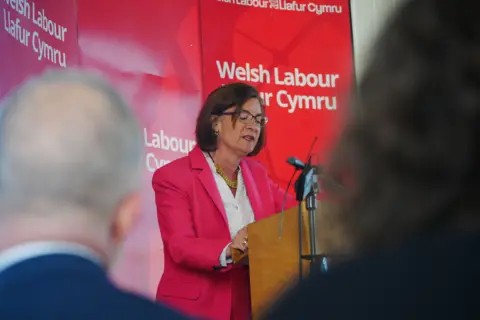Spending review sets scene for Senedd election
 Reuters
ReutersThe spending review that Chancellor Rachel Reeves will deliver this week isn't just a big deal in Westminster, it will also prepare the ground for next year's Senedd election.
She will tell UK government departments how much they will get to spend over the next three years.
In doing so, she will also reveal the funding available to the Welsh government that voters will elect next May.
Various parts of the UK government have been negotiating with the Treasury.
The Welsh government – which is responsible for the NHS, education and other big public services – has been doing something similar.
It can raise money through taxes, but the vast majority of its budget comes in a grant from Westminster.
That means the chancellor's decisions have a huge influence on what the Welsh government can and cannot do.
In Cardiff Bay, they await her statement with bated breath.
For months, Welsh government officials have been busily working on their own spending review, making long-term plans for the years beyond 2025.
They say they are grappling with a "challenging fiscal outlook".
In other words, they are not feeling flush.
But so far they have lacked a crucial piece of information: How much money to expect from the UK Treasury.
You might have heard of the Barnett formula - an obscure piece of mathematics that has a big impact on politics.
When the UK government spends more on things that are devolved to Wales the formula triggers a top-up to Wales' budget.
It looks likely the NHS will be prioritised by Reeves. Because health is devolved that would swell the Welsh government's budget.
But cuts to other UK departments could drag Wales' budget back down again.
 PA Media
PA MediaThe funding for the day-to-day running of public services, which pays for wages and administration costs, is likely to grow in this spending review.
But if lots of that is swallowed by health and defence, other parts of the government could suffer.
Reeves will have to make trade-offs between these competing priorities. Tough choices are "unavoidable", says the respected think-tank the Institute for Fiscal Studies.
The outcome will be closely watched in Cardiff, where political parties will soon start writing manifestos for next year's elections.
Decisions about how to pay for the policies in those manifestos will depend on how much money is spat out by the Barnett formula.
Eluned Morgan says she has asked Sir Keir Starmer for extra funding to reduce hospital waiting times, which have grown to record-high levels recently, and for social housing.
New railway stations for Wales
Her government is also waiting to see if plans for five railway stations around Cardiff and Newport are approved.
Morgan will hope Reeves offers something to turn around Welsh Labour's poor performance in recent opinion polls.
Those poll ratings make the Labour landslide at last year's general election seem like a distant memory.
At that time, Labour promised to form a government in Westminster that would work with the Labour government in Cardiff.
The spending review will be scrutinised as a crucial test of whether it is living up to that promise.
Because of that, Reeves won't just publish a load of spreadsheets that explain how taxpayers' money is divvyed up.
She will also set the terms of debate for a Welsh election in 11 months' time.
